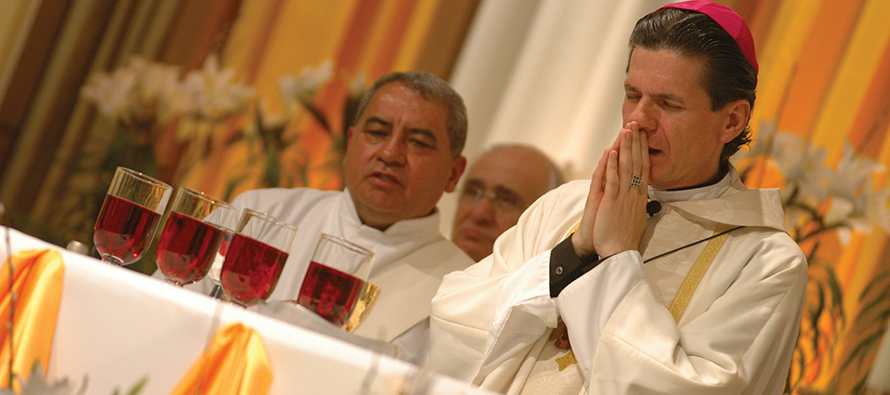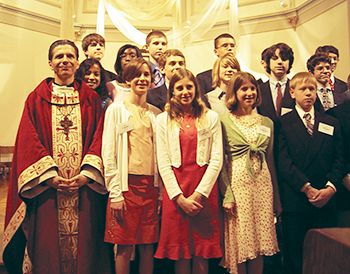Just call me Bishop Gustavo

WHEN POPE JOHN PAUL II called in 2003 to invite him to become an auxiliary bishop in Chicago, Gustavo says, “I called back to say no, but the office in Rome had already closed that Friday." Garcia-Siller prayed all weekend, mulling over the request. Now he says: “I just tell everyone to call me Bishop Gustavo." His responsibilities include an area of the archdiocese comprising 81 parishes with multiple ethnic origins, including a large population of Hispanics, for whom he is liaison to the archbishop of Chicago, Cardinal Francis George.
I grew up in the central-Mexico city of San Luis Potosí. I’m the oldest of 15 children in a lower-middle-class family. Both of my parents are from large families, so I was always connected to family and the community. Our family is close-knit; to this day we’re always calling each other and celebrating something.
My First Communion when I was 6 years old was a key moment in my life. It was then, after experiencing the Eucharist, that I first thought about the priesthood. That inclination was nurtured at home. My mother was very devout and very committed to social justice, and we kids used to be involved alongside her in different outreach projects to the poor. My father, a loving and responsible man, instilled in me character and a sense of commitment.
We prayed the rosary every day at home, and we kids were in charge of leading it. Sometimes when I was playing, I’d reenact the Mass—after all, with my big family I already had an assembly. But I didn’t need to reenact the Mass much because I attended every day. One of my aunts became a nun and one uncle became a priest, so I got into the habit of attending 6 a.m. Mass with him. Eventually, one of my sisters joined religious life and a brother became a diocesan priest.
Discovering love
The thought that I’d be a priest someday was always on my mind. When I was 13 or 14, though, I met one girl in particular that I liked. We dated in a formal sort of way. She was committed to her faith, and we’d often go into the barrios to serve with church groups. We decided that if our love for one another didn’t continue to grow, we would break up because it meant we weren’t meant to marry each other. When that moment finally arrived, it was very painful for both of us. Today she’s married to my cousin, and we’re still friends.
I am still growing in love, but now I do it as a celibate man. I know I could have married my girlfriend and I probably would have been a good husband and a good father. But this is my calling, not my career, but my whole way of life. I appreciate the value of celibacy, that following Jesus—who was also a celibate man—allows me to be a mentor to others, to love them in a way that’s different from married love in a profound and universal way.
That’s the point of it all: Love. And the source is not myself. I don’t ever run out of love because the love I have comes from God, and his love is eternal. If I die tomorrow, and I know that I loved, then I can die happy. It’s all about love.
When I think about my life as a priest and a bishop—and it’s been a really happy life—I always go back to a phrase of my religious community, the Mexico-based Missionaries of the Holy Spirit: Belonging all to God, and belonging to all people. That says so much about the vocation to be a priest, brother, or sister.
| Bishop Gustavo Garcia-Siller with kids from the 2005 confirmation classes of St. Mary's and Sheil Catholic Center in Evanston, Illinois. To young people thinking about a church vocation, he says, "My key message is this: Become good at who you are." |
Choosing a path
Back when I was at a key decision point in my life, a priest said to me, “If you want to become a priest, where are you going to study?" I didn’t know there was a choice—I thought everyone went to the same place. “He said, I’m a Missionary of the Holy Spirit, why don’t you come see our place?" And he invited me to play soccer with his community. (I’ve always enjoyed playing soccer.
Back then I didn’t even know there were different kinds of priests—both religious and diocesan. But I went, and I met them, and after I got to know the community, I decided to enter their novitiate. What caught my attention was the way they lived. I didn’t have much ideology about the meaning of religious life—I just liked the way they lived, worked, and prayed together. They were a happy, committed group.
Prayer always at the center
I don’t find it difficult to pray. All the training and experiences I’ve had help me to pray today in spite of a busy schedule. I was never told, “You have to pray this many hours every day." From an early age, I connected faith to action. Faith is assimilated through action. When people want me to do another workshop or retreat for young adults considering religious life, sometimes I tell them that that “alone" is not going to do it. Why not have the young adults bring clothes to a family that’s just moved into the neighborhood from Mexico? If we want to know God’s love, we have to show God’s love in action.
At the same time, if I don’t have the experience of God in me, I cannot share it with anyone else. I spend an hour each morning and an hour and a half every evening in prayer. I like to pray in the chapel before the Blessed Sacrament. I need to be acquainted with the Lord. I cannot live without him. I need that time to allow Jesus to show me how to be a friend of his.
Get comfortable with who you are
If you’re a young person thinking about a church vocation, my key message is this: Become good at who you are. No matter what your language or culture is, if you are not able to be good at who you are at this moment, you will not be able to be good at whatever God is calling you to be in the future. Embrace your own language, your culture; know your values, your limitations, your collective history. Otherwise, you will feel incomplete. This is especially true for first- and second-generation Hispanics as well as other immigrants in the U.S. So often they live between two worlds.
I, too, am an immigrant. I am an American citizen. I am a Mexican. It took a lot of effort for me to live here when I came to study in a Los Angeles seminary. In fact, it still requires great effort for me to keep up with the language. I am still learning English, and I study it once a week.
My other advice for young adults is to ask—the more directly the better. Sometimes young Hispanics don’t feel welcomed and accepted in the American church, but I want them to be connected and to feel valued. Many young Hispanics have wondered about the possibility of being spiritual leaders. They and others have questions; they must ask those questions. Maybe they’ll ask, Can I be a priest even though I don’t have my papers? And I’ll tell them, let’s find you a seminary or novitiate in Mexico then; I don’t know if you have a religious vocation, but God is calling you to something. Let’s find out what it is. Maybe you’re divorced; maybe you have a history that involves drugs or jail. This is the reality for some low-income Mexicans.
I want to hear those questions. The church wants to hear those questions. If something is blocking you from pursuing your vocation and you have questions about it, those are good questions; let’s ask the questions and let’s look at the answers together.
Discern whether religious life or priesthood is what God is calling you to. Discernment is not just another word for making up your mind. Discernment is the process of deepening our lives, and that happens in concrete action and prayer. Let yourself be accompanied by someone else along your journey. Let someone witness your call.
I had dinner last week with 17 people considering religious life or priesthood. I think they could see the happiness I’ve found in this life. There’s such a richness in knowing God and giving your life to the community—not just “me and God" but God working in me for the sake of the community. Why not give it your life?
Turn to Our Lady
Finally, I want to draw attention to Our Lady of Guadalupe, who is so important for us. She represents what we Mexican Americans long for as a culture. Juan Diego’s experience is our experience. Mary opens avenues to the true God. She opens avenues for more ways to be in the church and for more ways to promote human dignity. The connection to Our Lady of Guadalupe is very wholesome, especially for Hispanics. I encourage Latino young adults who are considering priesthood or religious life to nurture that connection to Our Lady of Guadalupe. Prayer, community, Our Lady of Guadalupe—those are building blocks for following Jesus.
Tags
Related
- Taking a chance on God: Profile of Father David Gutierrez, C.M.F.
- About-face to the priesthood
- Moved by the power of the Eucharist: Profile of Father Duy Henry Bui Nguyen, S.C.J.
- No regrets: A grateful priest takes stock
- We’re different—in a good way: Profile of Father Roberto Mejia, O.Carm.
- Man with a mission
- Monastic life is habit-forming
- Ministering to migrants in a carport cathedral
- Connections make the man: Profile of Father Kevin Zubel, C.Ss.R.
- A priest (who’s been there) responds to the pain of addiction Read More
Most Viewed
- Find your spirituality type quiz
- Questions and answers about religious vocations
- Celibacy quiz: Could I be a nun? Could I be a brother? Could I be a priest?
- Resources for older discerners or those with physical and developmental differences
- About Vocation Network and VISION Guide


